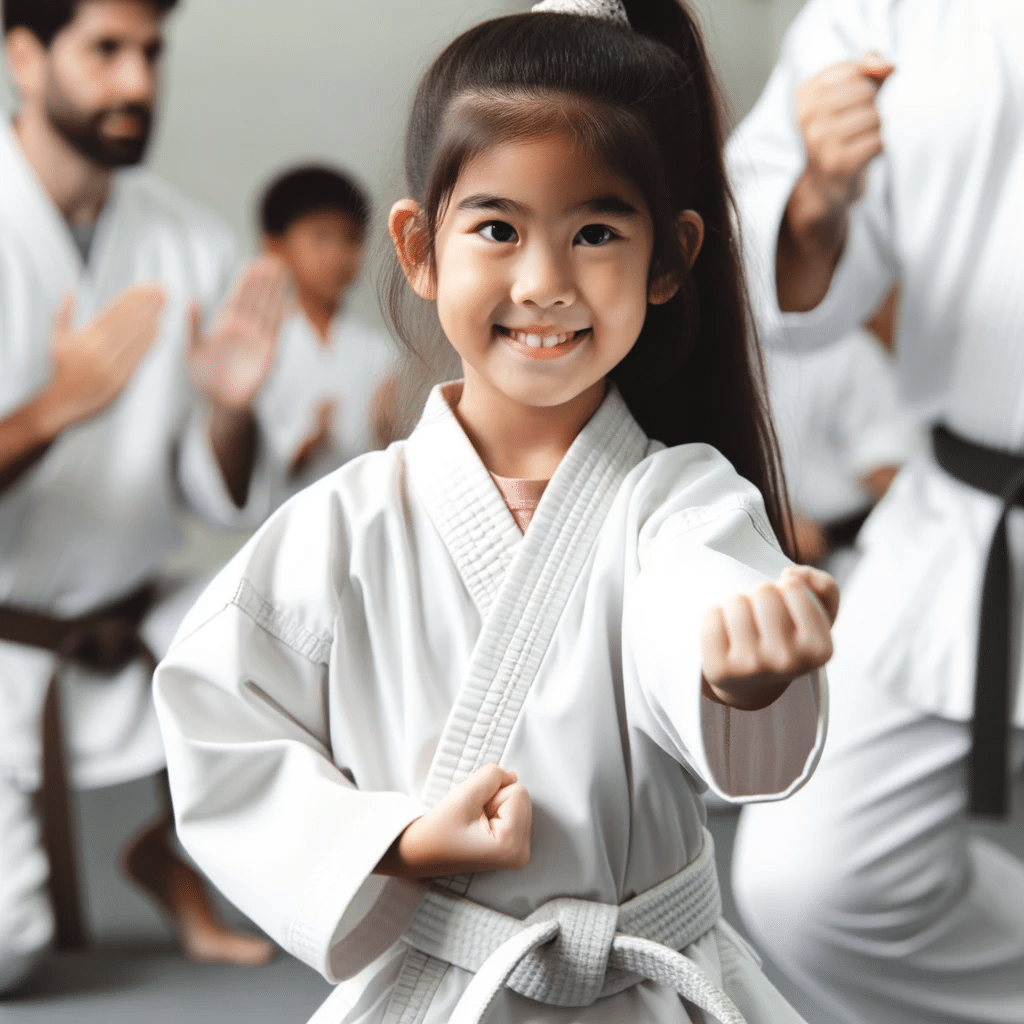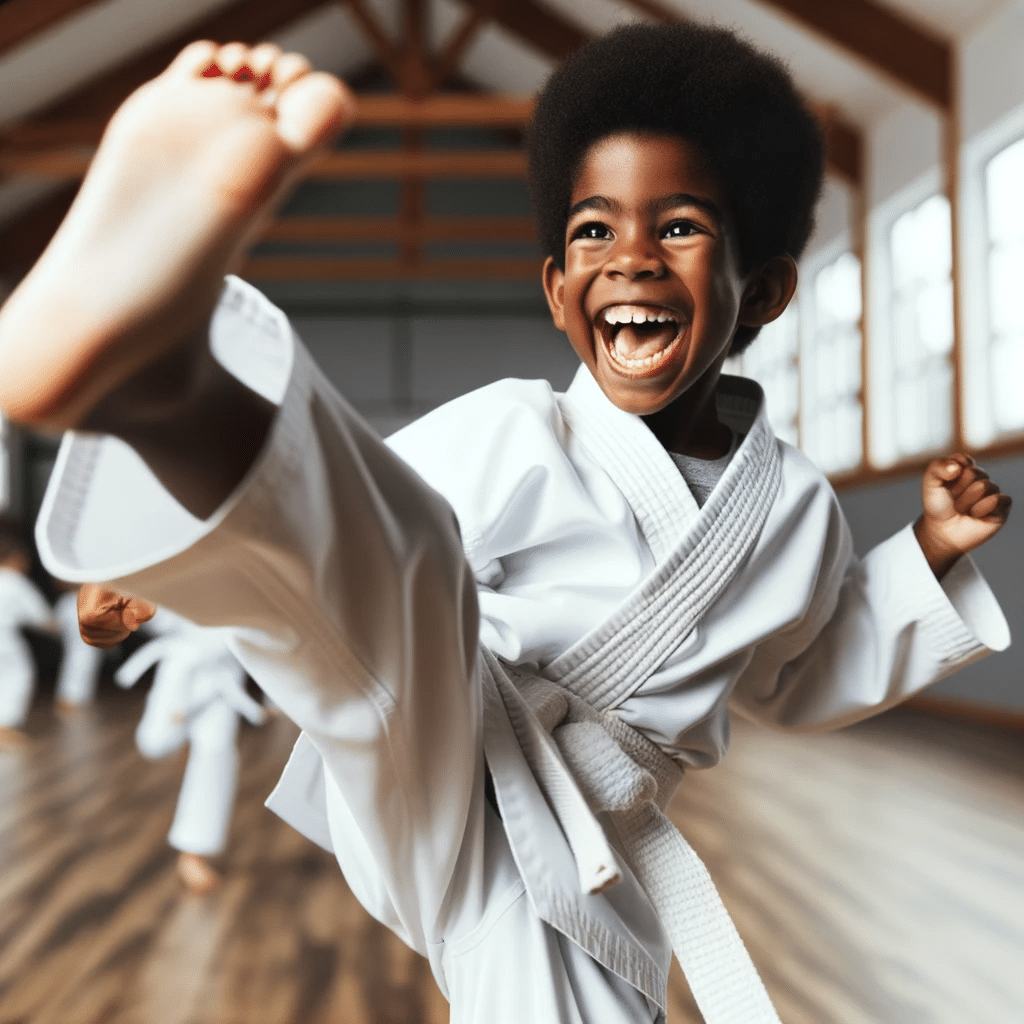Martial arts, an ancient practice rooted in self-discipline and physical prowess, holds a treasure trove of benefits for youngsters. Particularly for 6-year-olds, this age marks a time of burgeoning curiosity and boundless energy, which when channeled correctly, leads to holistic development.
Key Takeaways:
- Exposure to martial arts like Brazilian Jiu-Jitsu, Karate, and Taekwondo nurtures a well-rounded physical and mental development.
- Martial arts significantly improves cardiovascular health, balance, coordination, and strength in children.
- The practice instills valuable life skills such as self-defense, teamwork, discipline, and confidence.
- Martial arts engagement enhances academic performance by improving concentration and focus.
- The discipline aids in meeting developmental milestones essential for this age group.
Best Martial Arts for 6-Year-Olds
Brazilian Jiu-Jitsu, Karate, and Taekwondo: A Closer Look
The choice of martial arts for children is crucial to ensure they reap the maximum benefits while enjoying the process. Brazilian Jiu-Jitsu, Karate, and Taekwondo are often cited as suitable for 6-year-olds due to their non-weaponry nature and alignment with children’s physical and mental capacities.
| Martial Art | Core Focus | Key Benefits |
|---|---|---|
| Brazilian Jiu-Jitsu | Grappling and ground fighting | Enhances physical strength, problem-solving skills |
| Karate | Striking, punching, and kicking | Improves balance, coordination |
| Taekwondo | High, fast kicking and jumping | Develops agility, self-discipline |
It’s vital to choose a martial art that resonates with the child’s interest to ensure a positive and engaging experience.

Physical Benefits
Engagement in martial arts is a journey of physical transformation. The rigorous training sessions, practice drills, and actual combat improve cardiovascular health, balance, coordination, and strength among young practitioners.
- Cardiovascular Health: Regular training enhances heart health, reducing the risk of obesity and related conditions.
- Balance and Coordination: The practice of martial arts moves and techniques sharpens a child’s motor skills, fostering better balance and coordination.
- Strength: The physical demands of martial arts training promote muscle development and overall body strength.
Mental Benefits
Beyond the physical realm, martial arts is a conduit for mental and emotional growth. The practice cultivates a mindset of discipline, confidence, and respect which are transferable to many other aspects of life.
- Discipline: The structured training regime instills a sense of discipline and adherence to rules.
- Confidence: Achieving new belts and mastering techniques boosts self-esteem and confidence.
- Concentration: The need for focus during training enhances concentration levels, benefiting academic pursuits as well.
Life Skills Acquired
Martial arts is more than a physical discipline; it’s a life school. The dojo, where training occurs, is a platform for learning life skills that remain with individuals forever.
- Self-Defense: A primary motive for learning martial arts, it empowers children with the skills to protect themselves.
- Teamwork: Through group training and exercises, children learn the importance of teamwork and mutual respect.
- Respect: The etiquette of bowing and respecting the trainers and fellow students instills a sense of respect and courtesy.
Benefits in Academic Performance
The essence of martial arts transcends the dojo into classrooms. The improved concentration and discipline gained from martial arts training are reflected in a child’s academic performance.
- Better Concentration: The focus required in martial arts training translates to improved concentration in academic tasks.
- Stress Relief: Physical activity serves as an outlet for stress and anxiety, promoting a better learning environment.
Developmental Milestones
The age of 6 is a pivotal time in a child’s life where basic skills form the foundation for future growth. Martial arts serve as a catalyst in achieving these developmental milestones, aiding in both physical and mental development.
- Motor Skills: The various movements involved in martial arts training enhance gross and fine motor skills.
- Social Skills: Interactions within the dojo foster social skills and help in forming lasting friendships.

Transitioning into Martial Arts: The Right Age and Style
Transitioning into martial arts at age 6 provides a well-structured outlet for the boundless energy typical of this age group. Choosing the right martial arts style is crucial to ensure the child stays engaged and reaps the full benefits of the training. As discussed in Choosing the Right Martial Art for Your Child1, martial arts like Karate, Taekwondo, and Brazilian Jiu-Jitsu are often recommended for younger children due to their focus on discipline, respect, and self-control.
Initial Challenges and Overcoming Them
Embarking on a martial arts journey can present initial challenges for 6-year-olds, such as adapting to a new routine and overcoming the fear of failure. However, with the right guidance and a supportive environment, they can quickly overcome these challenges and begin to enjoy the numerous benefits of martial arts.
Engaging in Regular Practice: The Path to Mastery
Regular practice is key to mastering the basic techniques and advancing in martial arts. Through consistent training, young martial artists begin to see their progress, which in turn, fuels their motivation to keep learning.
| Aspect | Benefit |
|---|---|
| Regular Practice | Improved technique, enhanced self-discipline |
| Progression | Boosted self-esteem, motivation to learn |
The Dojo: A Community of Support
The dojo, or martial arts training center, becomes a community of support for young learners. It’s a place where they can form friendships, learn from others, and gain a sense of belonging. The camaraderie and support from both peers and instructors play a crucial role in a child’s martial arts journey.
The Multifaceted Benefits Revisited
Martial arts training offers a plethora of benefits that extend beyond the physical realm. The multifaceted benefits of martial arts include improved mental health, better academic performance, enhanced social skills, and a strong foundation of moral values like respect, discipline, and self-control2.
Preparing for The Future: Beyond Martial Arts
The skills and values learned through martial arts prepare children for the challenges they might face in the future. It lays a foundation for a lifelong journey of learning, growth, and self-improvement.
https://dennystrecker.com/kids-martial-arts-classes-age-specific-programs
Frequently Asked Questions
What are the best martial arts for 6-year-olds?
- Karate, Taekwondo, and Brazilian Jiu-Jitsu are often recommended due to their focus on discipline, respect, and self-control.
How can parents support their6-year-olds martial arts journey?
- Parents can support by ensuring regular attendance, encouraging practice at home, and showing interest in their child’s progress.
What are the costs involved in martial arts training for kids?
- The costs can vary widely based on the location, the reputation of the dojo, and the style of martial arts. It’s important to find a balance between cost and quality of training.